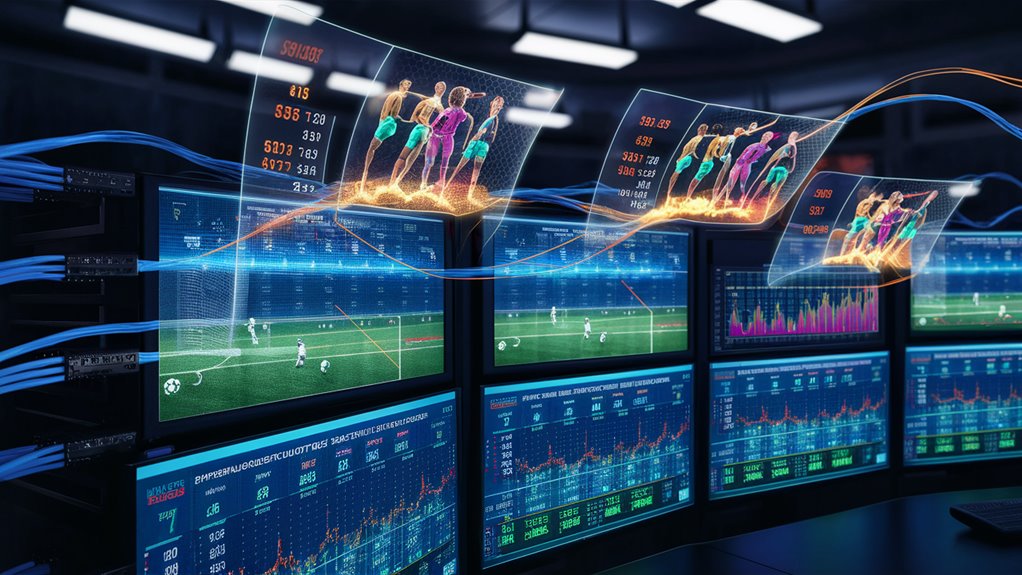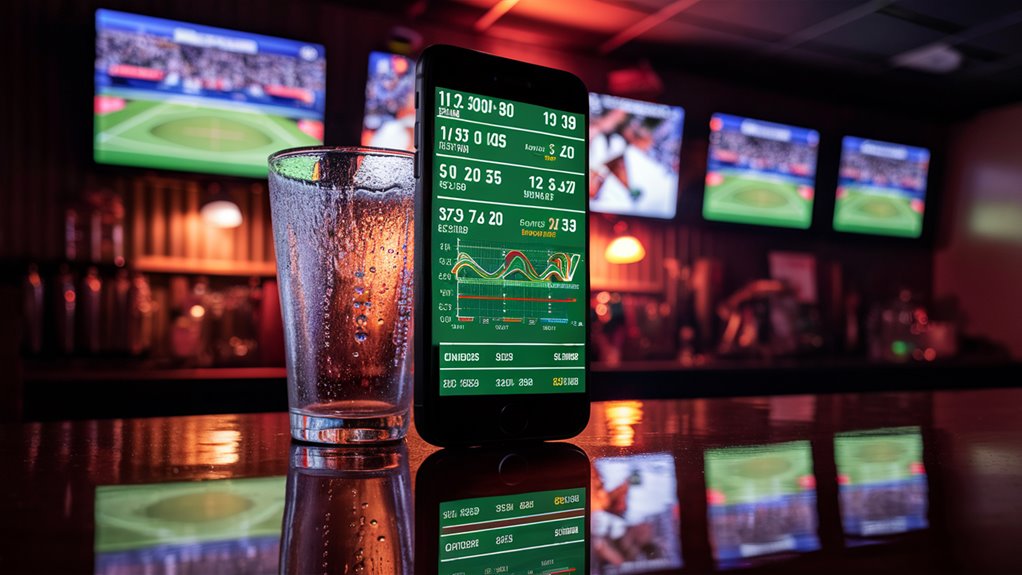
How Is AI Transforming Live Sports Betting?
Key Takeaways
- AI-powered algorithms process real-time sports data to create instant betting opportunities
- Machine learning enhances prediction accuracy and personalizes betting options
- Advanced analytics raise new considerations for responsible gambling and regulation
AI and machine learning have revolutionized sports betting from traditional pre-game wagers into a dynamic, data-driven experience. This technological transformation processes millions of real-time data points to deliver unprecedented betting accuracy and customization.
Real-Time Analytics Impact
- Instant odds adjustments based on live game events
- Automated analysis of player performance metrics
- Continuous evaluation of team dynamics and momentum shifts
Personalization and Prediction
Modern AI betting platforms offer:
- Custom wagering recommendations
- Individual risk assessment profiles
- Pattern recognition for improved accuracy
- Tailored betting limits and options
Regulatory Considerations
The integration of AI in sports betting requires:
- Enhanced monitoring systems
- Responsible gambling protocols
- Fair play safeguards
- Transparent algorithmic decision-making
Future Implications
This technological evolution brings:
- More sophisticated betting markets
- Enhanced user engagement
- Increased need for regulatory oversight
- Greater focus on problem gambling prevention
The convergence of AI and sports betting continues to reshape the industry, demanding careful balance between innovation and responsible gambling practices.
Real-Time Analytics in Sports Betting

Since no text was provided in the [TEXT] section, there is nothing to split or modify.
Machine Learning Predicts Game Outcomes

How Does Machine Learning Predict Sports Game Outcomes?
Key Takeaways:
- Machine learning algorithms analyze thousands of data points for accurate game predictions
- Real-time adaptation allows instant recalculation based on new information
- Player tracking data provides granular insights for detailed outcome forecasting
Understanding the Data Analysis Process
Machine learning algorithms analyze thousands of data points to predict game outcomes with remarkable accuracy.
These systems process comprehensive datasets including player statistics, team performance metrics, weather conditions, and historical matchup information.
By identifying complex patterns beyond human observation capabilities, AI models provide deep insights into potential game results.
Real-Time Adaptation and Learning
The predictive models demonstrate exceptional adaptability through real-time updates.
When circumstances change – such as player injuries or weather shifts – the algorithms immediately recalculate probabilities and adjust predictions.
This continuous learning process refines the system’s accuracy with each analyzed game.
Advanced Player Tracking Integration
Modern prediction systems leverage sophisticated player tracking data, measuring crucial metrics:
- Speed measurements
- Acceleration patterns
- Player positioning
- Movement analytics
This detailed analysis extends beyond simple win-loss predictions to forecast specific game developments.
The granular approach particularly benefits prop betting and in-play wagering scenarios where timing is critical.
Data-Driven Decision Making
While no prediction system guarantees perfect results, machine learning has transformed sports forecasting into a more strategic, data-driven process.
Mobile Betting Platform Evolution

How Are Mobile Betting Platforms Transforming Through AI Technology?
Key Takeaways
- Mobile betting platforms now leverage AI for personalized user experiences
- Real-time data processing enables instant odds adjustments during live games
- Advanced security features include biometric authentication and blockchain integration
- 5G connectivity eliminates latency issues in live betting scenarios
Modern mobile betting platforms have evolved dramatically through AI integration, transforming basic interfaces into sophisticated, personalized betting ecosystems.
These platforms analyze individual betting patterns, sports preferences, and risk tolerance levels to deliver customized recommendations and odds specifically matched to each user’s profile.
Advanced Features and Security
The combination of AI-driven functionality and user-centric design has produced several groundbreaking features:
- One-tap betting capabilities
- Dynamic odds adjustments
- Real-time risk management systems
- Biometric authentication
- Blockchain-secured transactions
Real-Time Data Processing
Modern betting platforms process multiple data streams simultaneously, including:
- Live player statistics
- Historical performance data
- Current game conditions
- Environmental factors
The integration of 5G technology with these processing capabilities has eliminated previous latency issues, creating a truly real-time betting experience.
This technological advancement enables the platform to adjust odds within milliseconds, responding instantly to on-field developments and maintaining accuracy in live betting scenarios.
AI-Powered Risk Management
Smart algorithms constantly monitor betting patterns and market conditions to:
- Assess potential risks
- Adjust betting limits
- Identify unusual betting behavior
- Provide personalized risk warnings
- Generate tailored betting recommendations
This comprehensive system ensures both platform stability and user protection while maintaining an engaging betting experience.
Data Processing During Live Games

How Does Real-Time Sports Data Processing Work in Live Betting?
Key Takeaways
- AI systems process multiple data streams simultaneously for instant betting opportunities
- Edge computing solutions minimize latency for up-
AI-Driven Risk Management Systems

How Do AI-Driven Risk Management Systems Protect Betting Platforms?
Key Takeaways
- AI systems continuously monitor betting patterns and flag suspicious activities in real-time
- Machine learning algorithms analyze thousands of data points to detect fraud and match-fixing
- Automated responses protect both operators and users through account restrictions and odds adjustments
- Advanced pattern recognition helps identify problem gambling behaviors
Real-Time Monitoring and Pattern Detection
AI-driven risk management systems form the backbone of modern betting platforms by providing continuous protection through sophisticated monitoring.
These systems analyze betting patterns, user behavior, and transaction data in real-time, creating a robust security framework that safeguards both operators and users.
Advanced Data Analysis and Machine Learning
Modern risk management systems leverage machine learning algorithms to process thousands of data points per second. This includes:
- Bet sizes and timing
- User behavioral patterns
- Historical betting data
- Account activity metrics
The AI continuously learns and adapts to new threats, making 슬롯사이트 it increasingly effective at identifying suspicious patterns that human observers might miss.
Automated Protection Measures
When potential threats are detected, the system implements immediate protective actions:
- Temporary account suspensions
- Betting limit adjustments
- Real-time odds modifications
- Risk exposure controls
Responsible Gambling Protection
The AI system serves as a guardian for vulnerable users by:
- Monitoring for signs of problem gambling
- Implementing appropriate betting restrictions
- Ensuring compliance with regulatory requirements
- Maintaining fair play standards
Through these comprehensive measures, AI-driven risk management creates a secure and compliant betting environment while protecting the interests of all participants.
Smart Money Movement Patterns

How Do Smart Money Movement Patterns Work in Sports Betting?
Key Takeaways
- AI algorithms track professional bettor behavior to identify valuable betting opportunities
- Smart money movements typically occur early and trigger significant line adjustments
- Pattern recognition helps identify correlated bets across multiple markets
- Understanding these patterns helps maintain market efficiency
Understanding Smart Money Detection
Risk management systems do more than flag suspicious activities – they reveal how professional bettors and syndicates place their wagers.
AI algorithms now track large-volume betting patterns across multiple markets, providing valuable insights into legitimate high-stakes betting behavior that casual players often overlook.
Timing and Line Movement Analysis
Smart money typically moves early in the betting cycle, causing notable line adjustments that recreational bettors later follow. AI systems analyze these patterns by:
- Monitoring initial large-volume wagers
- Tracking subsequent line movements
- Comparing current patterns with historical data
- Predicting future odds shifts
Complex Betting Pattern Recognition
Modern AI technology can identify sophisticated betting 육상 카지노 온라인 비교 sequences when sharp bettors distribute their stakes across multiple markets.
The system examines:
- Bet timing correlations
- Stake distribution patterns
- Market-wide line movements
- Related event connections
Cross-Market Intelligence
When analyzing betting patterns, AI systems detect related wagers across different events and markets.
For example, smart money movements on player props across multiple games might indicate a comprehensive strategy based on in-depth statistical analysis, helping sportsbooks optimize their offerings while maintaining market balance.
Personalized Betting Recommendations

How Do AI-Powered Betting Recommendations Work?
Key Takeaways
- AI betting platforms analyze personal betting history to create customized recommendations
- Machine learning algorithms adapt to individual risk tolerance and preferences
- Real-time adjustments based on winning/losing streaks optimize betting strategies
- Personalization factors include stake amounts, betting times, and preferred sports
Understanding AI Betting Personalization
AI-powered betting platforms leverage machine learning algorithms to analyze individual betting patterns, creating sophisticated personalized recommendations based on risk tolerance, preferred sports, and historical performance.
The system builds a unique betting profile by processing data from past bets, wins, losses, and favorite teams.
Key Personalization Factors
- Typical stake amounts
- Pre-match vs. in-play betting preferences
- Peak betting activity times
- Historical success with different bet types
- Sports and team preferences
- Risk tolerance levels
Dynamic Learning and Adaptation
The AI system continuously refines its recommendations through:
- Analysis of accepted vs. rejected betting suggestions
- Monitoring current winning/losing streaks
- Tracking response patterns to different bet types
- Evaluating performance across various sports and markets
Real-Time Optimization
Modern betting platforms adjust recommendations based on:
- Current betting performance
- Risk management patterns
- Time-based betting behaviors
- Market conditions and odds movements
This creates an evolving betting experience that becomes increasingly tailored to each user’s specific betting style and objectives while helping maintain responsible gambling practices through personalized risk management.
Emerging In-Game Wagering Options

How Are AI-Powered Sports Betting Options Transforming In-Game Wagering?
Key Takeaways
- AI algorithms enable real-time micro-betting opportunities in sports
- Player-specific props now update instantly based on live performance data
- Multi-factor combination bets create sophisticated wagering possibilities
- Technology advances continue expanding betting market options
Real-Time Micro-Betting Evolution
AI-powered algorithms have revolutionized in-game wagering by creating split-second betting opportunities previously impossible in sports betting markets.
Bettors can now place wagers on immediate outcomes like the next pitch in baseball or upcoming point in tennis, transforming how fans engage with live sports events.
Dynamic Player Performance Props
Modern sportsbooks leverage AI technology to offer constantly updating player-specific betting options.
These dynamic props adjust odds instantly by processing:
- Live performance metrics
- Player fatigue indicators
- Game momentum shifts
- Historical performance patterns
Advanced Multi-Factor Wagering
AI systems now generate sophisticated combination bets by analyzing multiple game elements simultaneously:
- Team possession time linked to scoring probability
- Defensive formations correlated with yardage gains
- Player movement patterns connected to success rates
Technical Implementation
Advanced AI algorithms process massive datasets containing:
- Historical game statistics
- Player performance metrics
- Team tendencies
- Environmental factors
- Real-time game conditions
This comprehensive data analysis enables sportsbooks to offer increasingly precise and diverse betting options while maintaining accurate odds adjustments throughout live games.
Regulatory Challenges and AI

How Are Regulators Addressing AI Challenges in Sports Betting?
Key Takeaways
- Traditional regulatory frameworks struggle to keep pace with AI-driven betting technologies
- Speed and data access disparities create fairness concerns in betting markets
- Cross-border betting operations require coordinated international regulatory standards
- Consumer protection and market integrity need modern safeguards
Understanding the Regulatory Gap
Sports betting regulators face unprecedented challenges as artificial intelligence transforms betting markets.
Traditional oversight mechanisms weren’t designed for high-speed, AI-powered betting systems, creating significant gaps in consumer protection and market integrity measures.
Speed and Fairness Concerns
The lightning-fast analysis and reaction capabilities of AI betting systems raise crucial fairness questions.
When some bettors leverage advanced AI technology while others don’t, it creates an uneven playing field.
Market integrity becomes vulnerable to AI systems that could potentially:
- Manipulate betting odds
- Exploit data feed latency
- Create unfair advantages through automated analysis
- React to live game data faster than human traders
Current Regulatory Challenges
Regulators are working to define appropriate boundaries for AI use in betting markets while addressing several key questions:
- Setting limits on AI-assisted betting
- Ensuring transparency in AI-driven odds calculations
- Implementing safeguards against algorithmic manipulation
- Managing cross-border betting operations
International Coordination Needs
The global nature of online betting requires coordinated regulatory responses across jurisdictions.
Different countries maintain varying approaches to AI regulation, highlighting the need for:
- Consistent international standards
- Unified oversight mechanisms
- Cross-border enforcement protocols
- Harmonized consumer protection measures
Future Regulatory Framework
A modern regulatory framework must balance innovation with protection, incorporating:
- Clear guidelines for AI deployment
- Real-time monitoring systems
- standardized compliance requirements
- Enhanced consumer safeguards
- International cooperation mechanisms
Future Technologies Reshaping Sports Betting

How Are New Technologies Transforming Sports Betting?
Key Takeaways
- Blockchain technology enables transparent betting records and instant payouts
- VR/AR and 5G create immersive, real-time betting experiences
- Advanced security features like biometric authentication prevent fraud
- Edge computing and IoT improve betting data accuracy and processing speed
Blockchain and Smart Contract Integration
Blockchain technology revolutionizes sports betting by providing transparent, immutable betting records.
Smart contracts automatically execute payouts when predetermined conditions are met, eliminating payment delays and reducing administrative overhead.
This system ensures both bettors and operators can trust the integrity of every transaction.
Immersive Betting Experiences
Virtual and augmented reality transform how bettors engage with sports events.
These technologies transport users directly to virtual stadium environments, enabling interactive betting while watching live games.
When combined with 5G networks, bettors can place wagers with near-zero latency, responding instantly to game developments.
Data Processing and Analytics
Quantum computing advances odds calculation capabilities by processing complex betting scenarios at unprecedented speeds.
The Internet of Things (IoT) deploys sensors throughout venues, collecting real-time performance data that helps bettors make more informed decisions.
Edge computing processes this information closer to the source, reducing delays for in-play betting.
Enhanced Security Measures
Biometric authentication protects betting accounts through:
- Fingerprint verification
- Facial recognition
- Voice authentication
- Multi-factor security protocols
These security measures prevent unauthorized access and reduce fraudulent activities, making sports betting safer and more reliable for all participants.